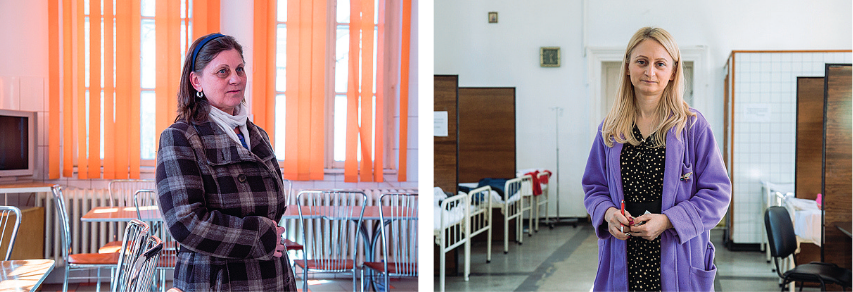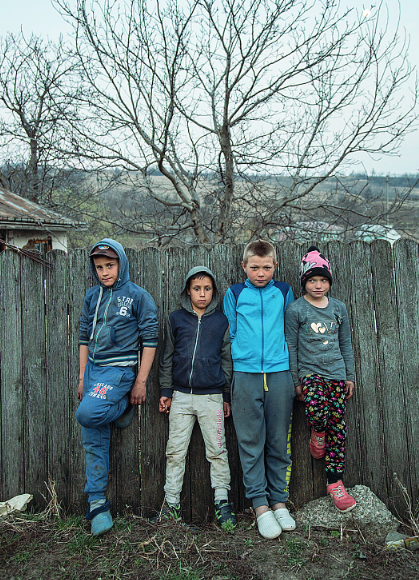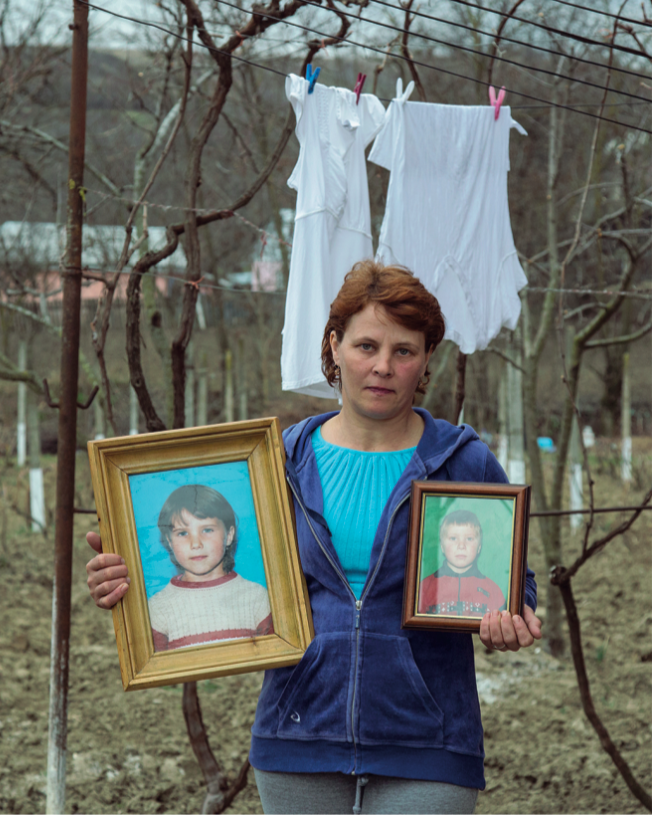Investigative
Reporting
Award
100 Days in Europe
published by Corriere della Sera, Italy
A trip across Romania meeting people who look after and have looked after our dear ones. They are hundreds of thousands. These care workers return home finding it hard to resume normal life. They suffer from anxiety and have panic attacks. Their ‘white orphan’ children are left at home with the grandparents. Some women carers say: “They no longer want me. I have given away my life to Italy”.

Photo: Francesco Giusti/Prospekt
The clinic for our carers is called “the Italian Syndrome” – It affects many women who have left everything at home, including their children
Nicoleta, you are disgusting! Nicoleta, clean up! Nicoleta shut up! “I always hear those voices…”. She can still hear those screams ringing in her ears of the elderly sick man suffering from Alzheimer’s and his wife. She has memories in her head of the house in Treviso. It was like being in a prison without sleep and without permission to have time off, neither on Saturdays nor Sundays. “I dream of those people every night. Two zombies! They used to grab me; they hurt me!…”. Nicoleta is sitting and staring at the hydrangeas in the clinic grounds under the shade of a carob tree. She is sitting awkwardly in a black overcoat, which makes her fifty-two year old body look old. She sits on the same bench every day at noon. She was a carer for ten years and now she no longer has anybody to care for, not even herself.
She spends her time having therapy: “I realized I was speaking to voices when I returned home in 2012. I felt I was a prisoner; I could never sleep and I would run away. I had panic attacks and I would cry. My two children would look at me as if I were a stranger. They were right. They had grown up without me. By now, too much time had gone by. In the end, they went away”. Nicoleta smiles into space: “I have stayed here, whilst they have escaped to live in Sicily. It is just like before; we never see each other”. It is best like that: “Of course, why would they have stayed with me? They have their own lives to lead. I have given away my life to Italy”.
She was a carer for ten years and now she no longer has anybody to care for, not even herself.
Lives to be lost
Ah, Romania, the servant, a place filled with pain! There are over two hundred Nicoletas a year at the Iasi Socola Institute of Psychiatry. They are depressed, without appetite, they suffer from insomnia, schizophrenia, anxiety, panic attacks, hallucinations and obsessions. Some went mad. Others tried to commit suicide. There are about a million care workers we take on at home and we think we know them. Only Syria exports more migrants to Europe than Romania, and they become lost lives when they return home.
Their complaint has a scientific name, which has caused us, as the largest European importers of affection for a fee, to be known as “the Italian Syndrome”.
This type of stress was diagnosed and first given this name by two psychiatrists from Kiev. In 2005, they have noticed common symptoms in many Ukrainian, Romanian and Moldavian women, including women from the Philippines and South America. They had all emigrated for years to care for elderly people far away in rich Europe, leaving behind children and husbands.
“More than a disease, ‘the Italian syndrome’ is a medical-social phenomenon,” explained Petronela Nechita, consultant psychiatrist at the Iasi clinic: “There is the prolonged lack of sleep, separation from the family, the delegation of motherhood to grandparents, husbands, and neighbours… We have many case studies. The situation got worse when Romanian women from the south of the country, where they used to work in the fields and were paid less, moved to the north of Italy to take care of the elderly. Our patients include mostly women who refused to take their days off and who refused free time in order to earn more money. They ended up totally exhausted from the hard work. Nobody can care for a person suffering from dementia or care for a person who is not self-sufficient for 24 hours a day alone, without ever taking a break. With the mental burden of what they have left behind, I would also get ill and so would you. On their return to Romania, the therapy for “the Italian syndrome” could last up to five years and it is rarely available on national healthcare. The cost is an average monthly salary of €240 over twelve periods a year.
A third of the women admitted to hospital attempted to commit suicide at least once, and they often did succeed. It is a silent massacre, because the family usually asks for the wording in the death certificate to be changed. In the poorest region of the EU, in Iasi, the place of “the hundred churches”, as this main city of the Romanian Moldavia is also called, and which Pope Francis Bergoglio will visit in June. Orthodox popes deny funerals and a Christian cemetery burial to those who take their own life.

Children from the village of Comarna, Iasi
Photo: Francesco Giusti/Prospekt
Abandoned villages
“Dor” is an almost untranslatable feeling that all carers know: the craving for what has been abandoned, that pining for what will never be found again, the anxiety for so much suffering to end. “Mi am un singur dor/ în linistea serii/ sa ma lasati sa mor” (I have only one dor in the silence of the night, let me die), verses written by the great local poet Mihai Eminescu.
Botosani, the village where he was born, has been abandoned by emigration. Today it breathes new life thanks to the lady mayor, who has managed to obtain legal contracts and more humane work shifts in Germany and Spain (“but not in Italy”). Likewise for Butea, where they have paved the road with asphalt, opened nursery schools for abandoned children and bought small coaches to bring the mothers back every month. However, these are exceptions. Everywhere else is like ghost towns of the Far West.
“Everybody left Comarna, but five thousand ghost inhabitants have sprouted up”, smiled the mayor Costel Gradinaru. They are Moldavian women (from outside the European Union), all residents at the same address as the house of a complicit policeman so that they can get a Romanian passport (in other words an EU passport) more easily and they can go to Italy from Moldavia without a visa.
People meet at a departure point at dawn every day in Via Nationala behind Iasi station, the hub of betting shops and striptease clubs, queuing up to leave by coach (Flixbus, AmiTuring or Atlass). Tickets cost €70 to Padua, €110 to Palermo – with a 40 kg baggage allowance. This is all run by gypsy gangs, who sell shoes, jackets and mobile phones alongside the ticket offices. Somehow these items were picked up in Italy.
“The tough time was when both mummy and daddy left. My mother is still in Taranto. I speak to her twice a day, but it is not the same thing. I would like her to be here. I have two brothers, younger brothers, who almost hardly know her.”
Spread around was a desert of new small empty houses with windows still covered in cellophane built with the money transferred from abroad.
“I felt like a slave in Rome”, said Gabriela Neculai, who earned 700 euros a month and never had a day off in ten years. “I did not even buy myself some fruit juice or an ice-cream. I sent all the money to Romania. Now I have a lovely house, but I am alone. No, it was not worth it”. Carmen, who is 58, spent ten years in Biella: “I could only wash once a week. They controlled my food, and I had to warm up water on the radiators. Now my family cannot stand me. I am like a spy. I write down what is being consumed. I am obsessive. Italy has made me become like this”.
“You Italians do not care about your parents at all. You take on a care worker and that’s it. You lead your own lives”, wept Elena Alexa, who is 60 years old and who has been in therapy for five years. “I worked in Verona off the books. I was given little to eat and I lost weight dropping to 50 kilos. I was looking after an elderly man who weighed 100 kilos. I was allowed six apple halves a week. Every day he would eat one half and give me the other half. They put my bed in the corridor where the dog slept. They would sling swear words at me, such as Romanian daughter of a bitch… you are all starving beggars! I gradually began to have panic attacks and a permanent pain in my throat. In the meantime, my family was going to the dogs. I had abandoned my parents to go and look after other people’s parents. My young son used to sleep with my photo under his pillow and trembled all the time. He used to phone me begging me: “Come home, or else I shall go on the roof and throw myself down…”. “He already had white hair at the age of 19”.

The return home
Elena Tescovina (in this photo showing pictures of her children) has just returned after working for many years as a carer in Florence and Milan. She lives in Comarna, a village near Iasi in the Moldavia region, which has almost been abandoned, because most adults work abroad.
Gabriela Neculai spent many years working in Italy. Now she is being treated at the “Socola” Psychiatric Institute in Iasi. Dr Nechita Petronela, head psychiatrist at the clinic: “More than a disease, ‘the Italian syndrome’ is a medical-social phenomenon. There is the prolonged lack of sleep, separation from the family, the delegation of motherhood to grandparents, husbands and neighbours…”
Photo: Francesco Giusti/Prospekt
Side effects
It is the person who makes the place, the Romanians say. It is their actions, which tell the story. A thirteen year old girl hung herself in mid March. This is the latest case. It is a side effect of “the Italian syndrome”, which also affects the 750 thousand children of the care workers, the so-called “white orphans” whose stories are told in Ingrid Coman’s novels. “It is a stereo type to think that all Italians are indifferent to the situation of care workers”, commented the writer, who is moving her family to Iasi. “I would not generalise. Understanding depends on individuals, not on society. However, it is a fact that in Italy, we are looking at a number of cases of slavery, and at the consequences caused.”
Silvia Dumitrache, Italian leader of the Romanian Women’s Association, keeps track of the children who commit suicide – not being able to cope with being left behind. They are about a hundred to date. Thirty seriously ill children hidden from the world suffering from depression have been admitted to the Iasi clinic. They do not know what to do with them, as there are no child neuropsychiatrists. Mihaela Hurdurc, head of the Caritas school, explained: “We had Alex, a seven year old boy who returned home with his mother. She felt she was a failure. Alex could not adapt to the new life and refused to eat non-Italian food. He wanted to commit suicide, so we had to admit him to the clinic. The discomfort of those left behind is diverse. They suffer from various disorders, such as anger, anxiety and learning difficulties. There are those who are ashamed of the fact that their mother lives away. Others live with their grandparents, who are too elderly. Others live with neighbours, who are too much like strangers. Others are left on their own to fend for themselves. Parents sometimes go away to Italy and do not appoint anybody to be in charge of their children; they disappear for months and never contact the school. They sometimes even change phone card and so the children do not even have a number to contact”.
The village libraries get filled up with the poorest children at a certain time in the evening. They have wifi available so at last, they can speak to their parents in Italy. “The hardest time in my life was when both mummy and daddy left”, said Michael Chiriac, a ‘white orphan’. “The happiest time was the first Christmas together. I was ten years old. Now I am 22 years old, and my mother is still in Taranto. I speak to her twice a day, but it is not the same thing. I would like her to be here. I have two younger brothers. They hardly know her”.
In a well-refurbished house at address No. D786 Comarna, Elena Tescovina has just returned from Florence and Milan: “Eight years! I only went out of the house to take out the rubbish…”. She was convinced to return to her daughter. “Mummy, we can just live on bread and dripping, but do not leave again!” …with an irrepressible sadness: “Nobody can understand how I felt”. She does not like what she found on her return: disputes, beatings, and alcoholism. Living with an unrecognisable husband amidst her grievances for him: “You have never had a job!” and his reproaches to her: “You talk too much, you sound like an Italian!”. Pure syndrome.
They all advise her to go to the clinic. Elena cries, as she blames herself. However, she does not intend going for the time being: “I shall get better by working”. She travels 15 kilometres by bus to Iasi in the afternoons. She wears a uniform. She is a security guard and has night shifts. “I have to care for the shops”. Those are her exact words: “to care for”.




